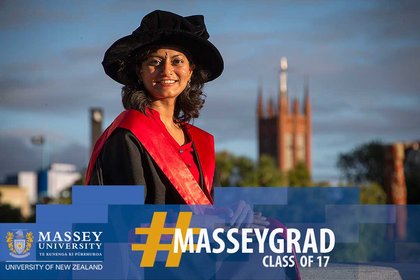
Dr Ivana Sequeira recently graduated with her PhD from the Manawatū campus.
Gut health has fascinated College of Health PhD graduate Ivana Sequeira for years. Now her research has helped to refine and develop a test to assess gut leakiness, especially in conditions such as coeliac disease and inflammatory bowel disease.
Dr Sequeira, who graduated with a PhD in Palmerston North recently, completed her thesis in 2015 and is now employed at the University of Auckland, where she holds a post-doctoral fellowship funded by the Ministry of Business, Innovation and Employment as part of the National Science Challenge High-Value Nutrition programme.
The Peak Nutrition for Metabolic Health Programme is one of the five priority research platforms in the Science Challenge. It is focused on investigating the susceptibility of the “at risk” population to diabetes, and to study the association and risk related to the storage of fat in vital organs.
Dr Sequeira’s PhD thesis explored the use of the lactulose mannitol test (leaky gut test) of gut permeability for use as a dynamic test of gut “health” or robustness. Gut permeability determines what nutrients the body absorbs and is crucial for overall health. Permeability, and the cells that control it, can be disturbed by harmful bacteria preventing optimum nutrient absorption, and can lead to immune dysfunction and disease.
She developed a test in which gut health could be inferred from its resilience and recovery to a standardised oral dose of 600mg aspirin. The rationale was based on the premise that every day our gut is constantly challenged – such as bacteria, food components/allergens and medications – and must maintain an appropriate equilibrium in order to maintain health.
Dr Sequeira's research has received numerous accolades and has been endorsed in an editorial in a peer review journal. Her work on developing the lactulose mannitol test was awarded a Return on Science Fund from the Ministry of Business, Innovation and Employment Pre Seed Accelerator Funding and Massey Ventures Ltd, Massey University. This allowed her to continue working in the Digesta Group at Massey University.
She also has a Master of Medical Science from the University of Sheffield in the United Kingdom, and says studying gastrointestinal physiology was a natural step for her as she is interested in health and wellbeing, particularly in the field of nutrition.
She says her PhD would not have been possible “without the immense support from my family and loved ones”.
The 36-year-old from Mumbai, India, moved to New Zealand to pursue her PhD, which was funded by the Ministry of Science and Innovation grant awarded to Plant and Food Research. She now lives in Mount Eden in Auckland.